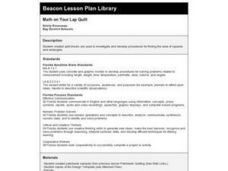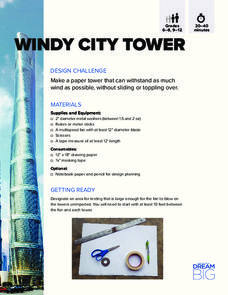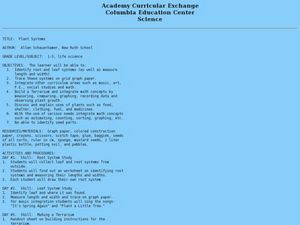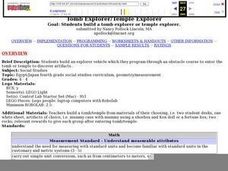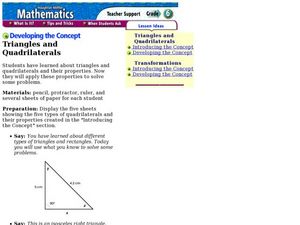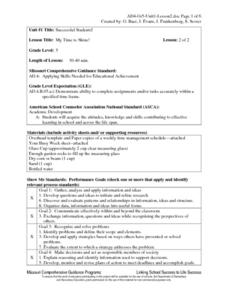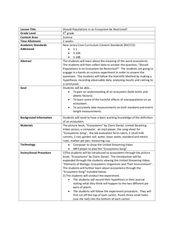Curated OER
Math On Your Lap Quilt
Get creative juices flowing when you allow groups to figure out a procedure for how to find the area of squares and rectangles. They may use the individual patchwork blocks, or they may design one using the Design Template.
Curated OER
Classroom Archaeology
Students, in groups, receive a box of artifacts. They record their findings and discuss what the items would have been used for. They come together at the end of the lesson to share their findings.
Curated OER
Pythagorean Theorem by Graphic Manipulation
There are many different ways to show a proof of the Pythagorean Theorem. Here is a nice hands-on paper cutting activity that shows a graphic representation. You can even challenge your young Pythagoreans to come up with their own...
DiscoverE
Windy City Tower
Your class will be blown away when they build their own city tower structure! Engineering scholars partner up to plan, build, and test their own paper towers. As they build, they gain valuable design skills, learn about wind tunnel...
Missouri Department of Elementary
Acting Out Respect and Compromise
Puppets showcase the importance of being a good friend. Following a discussion about positive character traits, scholars create a paper-bag puppet and role-play scenarios with a peer.
Curated OER
Plant Systems
Students examine plant systems. In this life science lesson plan, students explore leaf and root systems on paper in a terrarium that they design and construct.
Curated OER
Tomb Explorer/Temple Explorer
Fourth graders build an explorer vehicle which they program through an obstacle course to enter the tomb or temple to discover artifacts.
Curated OER
Introduction to the Scientific Method
Students designs and conduct a scientific experiment that identifies the problem, distinguishes manipulated, responding and controlled variables, collects, analyzes and communicates data, and makes valid inferences and conclusions.
Curated OER
Amphibians-Frog Dissection
Learners compare the anatomy of a fish to an amphibian and that of an amphibian (frog) to a human. They complete a virtual frog dissection to gain some experience prior to the real dissection.
Houghton Mifflin Harcourt
Developing the Concept: Triangles and Quadrilaterals
Exact narrative and examples make this lesson on polygons easy to implement. Through it, your class will learn how to use a protractor and ruler to construct triangles and quadrilaterals according to your directions. Your class will be...
Curated OER
The Attack of the Manhole Monsters
High schoolers explore the concept of similarity. They examine such topics as ratio of corresponding sides, internal ratios and scaling factors. After watching a video, student groups perform experiments outside the school building.
Curated OER
Tick Around the Clock
Young scholars examine and discuss the differences between clocks they are shown. Using the internet, they research how people used to tell time before clocks. They review what the long and short hand on the clock represent and practice...
Curated OER
My time to Shine!
Fifth graders identify and acquire the attitudes, knowledge, and skills that contribute to effective learning in school and across the life span. Then they identify and practice through an experiment, time management skills and why it is...
Curated OER
Flour Beetle
Students observe the life cycle of the common flour beetle and make observations of its life stages. They also design and implement an investigation on food preference for the beetle and record data over a period of several months....
Curated OER
Targeting Careers: My Goal
Third graders investigate the concept of setting a goal within several different contexts. They participate in a game to illustrate the need for a goal and then focus upon the setting of a short term educational goal because of the age...
Curated OER
Learning by Logic - Total Surface Area
Geometers calculate the area of plane surfaces using the formulas for the area of a square, rectangle, and triangle. They develop the formula for calculating the total surface area of two geometric solids: the cube and rectangular prism.
Curated OER
Whole Language Approach to Map Making
Fifth graders, after reading Island of the Blue Dolphins, explore map making using the Whole Language Approach.
Curated OER
Box and Whiskers
Middle schoolers discover how to relate collected data with a box and whiskers graph in a number of formats. They collect, organize, create, and interpret a box and whiskers graph. Pupils interpret the difference between sets of data,...
Curated OER
Basic Drafting Skills
Students demonstrate the proper use of tools found in basic drafting. Using proper terminology, students identify tools and create Isometric and Orthographic drawings. Students convert Orthographic drawings into Isometric drawings and...
Curated OER
Cylinder Volume Lesson Plan
Tenth graders define the formula for cylinders and use it to solve real world problems. In this geometry lesson, pupils differentiate between area, perimeters, 2D shapes, 3D shapes, and volume of prisms, cylinders and spheres. They...
Curated OER
Mapping The Ocean Floor
Young scholars explore and analyze the bottom structure of underwater habitats. They describe and explain what can't see through the collection and correlation of accurate data. Learners assess that technology is utilized as a tool for...
Curated OER
When Dinosaurs Ruled the World
Students graph the varying sizes of dinosaurs. In this math and dinosaur activity, students view dinosaur models and compare the different shapes and sizes of the dinosaurs. Students complete a dinosaur math activity, read The Dinosaur...
Curated OER
Should Populations in an Ecosystem be Restricted?
Fourth graders experiment to determine how overpopulation effects ecosystems specifically plants. For this ecosystem lesson, 4th graders conduct an ecosystems experiment after listening to Claire Daniel's, Ecosystems. They watch a video,...
Curated OER
Application of Delta-Epsilon Definition of the Limit
Students create a Hexaflexagon using a formula. In this calculus lesson, students apply the definition of delta epsilon as it relates to limit to create a shape using creases. They relate the same rule to triangles and investigate angles.


